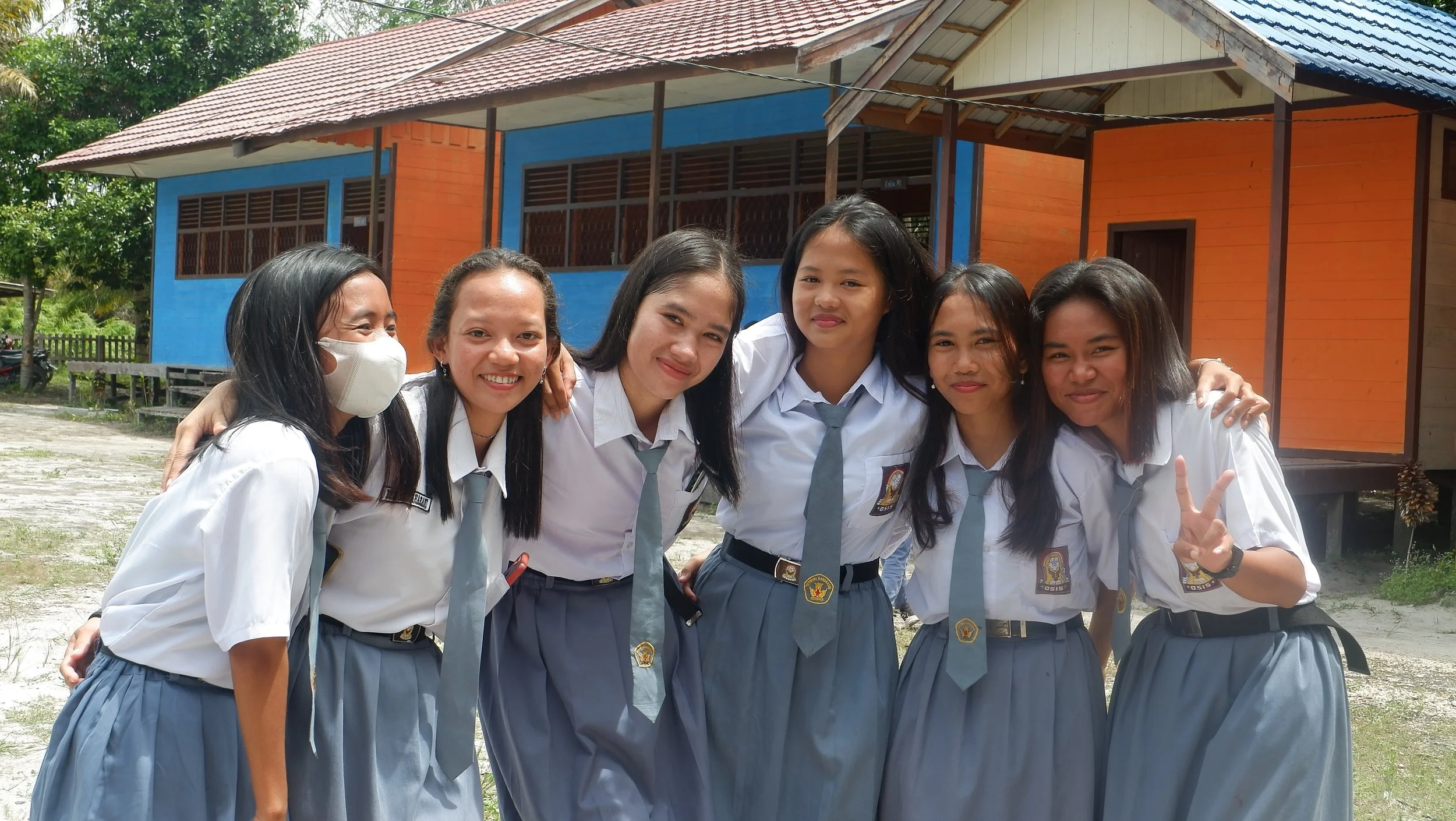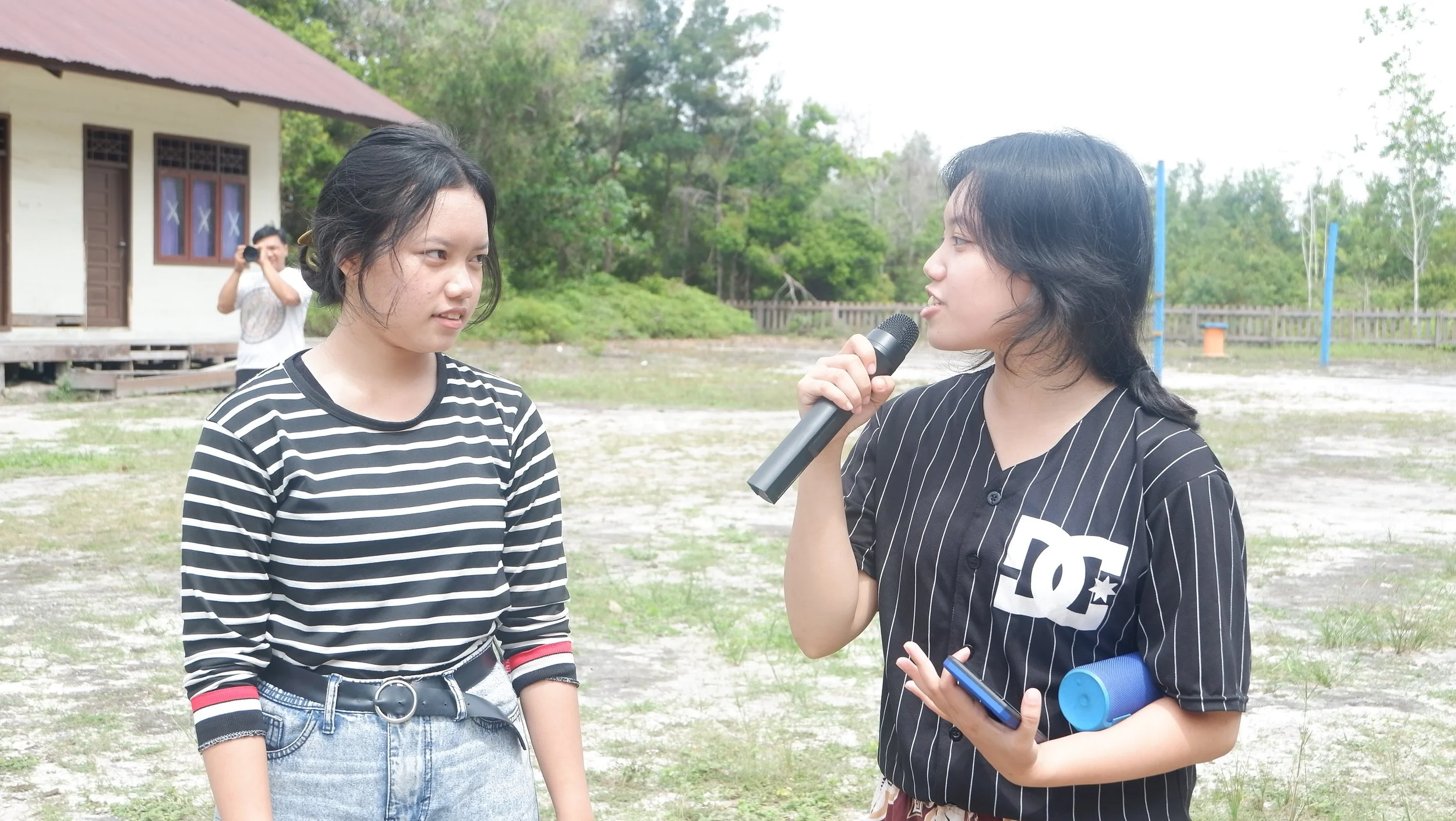It was a sunny morning in the rainy season of March. I was in such a rush to get to school that I neglected to appreciate the warm sun and the gentle breeze that started my day.
Siska (pink jacket) and her friends.
I was filled with excitement, anticipation, and curiosity – though also a bit of nervousness as well – over the special guests that would visit our school. Very rarely did people want to visit our school which was located in the interior of Kalimantan.
At 7am, after a one-hour motorbike ride from my village, I finally arrived at school, a single-story wooden structure, the only nearby high school in the region. Nothing really stood out as remarkable except for the decorative blue walls and the building’s high foundation, which formed a house on stilts.
There was a large assembly field in the center, and many students had already crowded there when I arrived. They wore neat white and blue uniforms, complete with hats and ties. Our teacher, Mrs. Puspita, cautioned us via a late-night Whatsapp message to dress neatly.
Students gathered in front of class building.
I lined up with my classmate, and in front of us, Mrs. Puspita stood with the other teachers. As typical with the morning assembly, she began to greet us and provide instructions over the loudspeaker. Once again, she mentioned that young people from the city would be visiting our school. Mrs. Puspita ordered, "You should welcome them warmly."
After we returned to our classes, I heard the sound of a motorcycle roaring into the parking gate. Perhaps they had arrived.
I walked out of the classroom to take a look at them. Six unfamiliar faces, three girls and three boys, were making their way slowly towards the teacher's office. Mrs. Puspita immediately greeted them. After about twenty minutes, I heard Mrs. Puspita from the loudspeaker. "Let's all gather at the field,” she said.
Slowly, we stepped onto the field. Six city youths were standing beside the teachers, smiling at us. Mrs. Puspita then gave the microphone to a pretty girl with shoulder-length black hair and slanted eyes.
"Hello everyone, my name is Sumarni Laman. I am from Kampuri village in Gunung Mas Regency. Currently, I am master degree student in School of Government and Public Policy in West Java," said the girl.
She then invited her other friends to come forward and introduce themselves as well. Rina and Rini were identical twin sisters with black long hair. Edo was the photographer who had ethnical Dayak tattoo on his feet. Jovi was a handsome man who frequently touched his hair with his hands. Yoki was a shy-looking man with glasses who sounded very nervous when he introduced himself.
Rina and Rini, the twins.
Sumarni initiated a concentration game as a warm-up activity. If we lost, we had to come to the front and sing. A bit shy, I knew I had to win. I listened intently to all of the instructions.
After a few rounds of play, two of my pals finally lost the game. Fortunately, it wasn't me who had to sing. They had wonderful voices, yet appeared awkward, perhaps because they were nervous. However, after two or three songs, the atmosphere became warm and boisterous as students joined in on the singing.
The visitors also contributed by singing the song “Membangun Mahaga Lewu” (“Build Villages” in English). Edo, the cameraman, led the song while playing the guitar. His voice sounded gentle as he strummed the guitar strings and singing the song.
‘Ela laya yo ela laya (don't be careless, don't be careless)
Mamangun mahaga lewu (Build and protect the village
Sanang mangat eka kahimat (We shall have a prosperous life)
Bahu himba harajur ihaga’ (if forests is maintained)
"Do you know the meaning of Membangun Mahaga Lewu?" asked Sumarni.
"It means to develop a village," said someone from the crowd.
"Yes, it means developing the village. And that's actually our main reason why we came here to Bundar Village and Talekoi Village -- to teach traditional dance, renovate the library, and plant trees. We want to develop the villages by empowering the youth – all of you,” explained Sumarni.
"Although we had to travel for eight hours through bumpy, muddy roads, we are really happy to be working for the village and meeting all of you," she continued.
I was so grateful for their travels. I understood how difficult it was to get to this area. I had to ride one to two hours from my hamlet in Maruga Village to this school in Bundar Village every day. The road turns slick and muddy when it rains. Riding on it could be more than difficult; it could be flat out dangerous. Even I had gotten into accidents in the past.
Sumarni then went on to tell us several stories about her experience studying in big city in Java island and her volunteers activities in numerous rural villages in Kalimantan and other provinces in Indonesia. I admired her courage to get a higher education in a city far away but still have the heart to build her community.
Then she invited Jovi, who was sitting in the teacher's room, to share his story as well.
Jovian, whose grandmother came from this village.
"I am a filmmaker,” he said. “My dream is to document Kalimantan's native stories and local wisdoms. Many others, however, do not believe in my vision. But I refuse to give up. I believe that everyone has the right to dream and be anything they choose.”
The experience of meeting these people has inspired my behavior. I am also a dreamer. I want to teach in a high school. Since my hamlet did not have a high school, my friends and I had to travel a long distance to school and endure numerous challenges. Children would no longer have to travel dangerous company roads or live away from their parents if my village had teachers and schools.
At the end of the meeting, Sumarni told us, “Everyone has the right to spread their wings and fly after their dreams, but they must also return to their roots, return to their villages, to help make them stronger.”
Today, in the present, I will graduate soon. I've been debating whether I should continue my education for a long time. Tuition is expensive, and the college is far away. Today, as I write this, I remember the story of the six people, whose fight to achieve their dreams sparked an excitement in me. I aspire to be like them, to be successful, and to be able to inspire others. As a third-grade student, I found hope in their stories, that even village children can achieve their dreams and become successful. I hold onto that hope now as I prepare for the next stage of my academic career – college.
Posing with teachers from Bundar high schools.
Story of Fransiska Handayani
Narrated and translated by Sumarni Laman
Edited by Denise Dragiewicz






